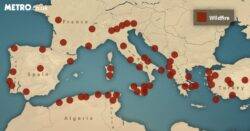Flames are spreading across much of southern Europe(Picture: Metro.co.uk/Datawrapper)
A map has shown the scale of wildfires across Europe.
People in countries such as Turkey, Greece, Italy, Spain, Portugal, Algeria and Tunisia seen their regions hit.
Tourists have been evacuated en-mass from problem areas while locals have been moved to temporary accommodation.
Terrified people spoke of fleeing with children in tow or via boat to escape the rising flames.
Flames burn in a field in Capaci, near Palermo, in Sicily (Picture: Alberto Lo Bianco/LaPresse via AP)
A man inspects a house burned in a wildfire in Bejaia Province, Algeria (Picture: Xinhua/Shutterstock)
A fire burns in the village of Gennadi on the Greek island of Rhodes (Picture: Angelos Tzortzinis/AFP)
In Greece, two pilots tragically lost their lives while waterbombing an ablaze area on the island of Evia.
In Algeria, at least 34 people have died and thousands have been evacuated due to wildfires.
This morning, a state of emergency was declared for the entirety of Rhodes due to the fires.
Turkish firefighters battled a wildfire near the resort of Kemer in the southern province of Antalya on Tuesday, tackling the blaze from land and air amid high temperatures across the region.
The blaze spread fast through woodland in the area as a result of strong winds and low humidity, the Antalya governor’s office said in a statement.
A closer look at the range of wildfires ongoing in Greece (Picture: Metro.co.uk/Datawrapper)
Firefighters battled wildfires that were spreading in the area south of the Croatian Adriatic city of Dubrovnik late on Tuesday.
Strong southerly winds preventing deployment of aircraft and landmines exploding, local media reported.
‘A hurricane southern wind blowing in the Dubrovnik-Neretva canton has fuelled a widespread open space fire in the area of the Dubrovnik Plat community,’ the Croatian Firefighters Community (HVZ) said on its website.
Wildfires in the Mediterranean will ‘clearly happen again’ and the travel industry needs to ‘rework its plans’, it was warned this morning.
Paul Charles, CEO of travel PR firm PC Agency, called for an overhaul of the Foreign Office travel advice system which left holidaymakers ‘confused and worried about losing their money’.
Thousands of Britons have been rescued from fire-hit parts of the popular Greek holiday island Rhodes while others are having to cancel planned trips.
The Foreign Office has not advised Britons to avoid non-essential travel to the entire island, while some travel companies are continuing to fly holidaymakers to Rhodes as they claim the blazes are not affecting the whole island.
Mr Charles said: ‘Sadly we’re going to have to get used to more incidents like this – wildfires in the southern Mediterranean are going to become more common, so the travel industry needs to rework its plans for how to deal with this sort of thing.
‘Consumers will want more reassurance in the future about the hotspot areas that will mean airlines and travel operators will need to have better plans in place for dealing with these sort of crisis and that might mean more flexible refund policies, it might mean putting more resources on the ground in a destination over the summer period so that they’re prepared.
‘I do think the Foreign Office now needs to conduct a complete overhaul of its travel advice system.’
A plane makes a water drop as a wildfire burns in the village of Gennadi, Rhodes (Picture: Reuters)
Firefighters attempt to extinguish a raging forest fire near the town of Melloula in northwestern Tunisia (Picture: FETHI BELAID/AFP)
Souhila Belkati carries her child inside her burnt house, following a wildfire in Bejaia, Algeria (Picture: Reuters)
Mr Charles added of the wildfires: ‘Clearly it will happen again in the future, if not this year then next year.
‘This is a wake-up call for airlines and travel firms to rethink their response plans in this sort of situation.’
One of the UK’s leading climate scientists, Sir David King, said climate change is set to fuel more severe blazes in the future and tourists planning trips to the Mediterranean should see the Greek wildfires as a ‘big, big warning’.
But trade association Abta said the travel industry is ‘well-versed in responding to international events’.
A spokesperson said: ‘The number one priority has been – and always will be – people’s health and safety. The response to the wildfires in Rhodes has been a collaboration between the Greek authorities, travel industry and UK Foreign Office.
‘The travel industry is well-versed in responding to international events, particularly in rapidly changing circumstances, with the health and safety of customers the priority.
‘It has clearly been a very difficult and upsetting time for those affected by the wildfires, both in Rhodes and due to travel, and Abta members have been working flat out to support those customers.
‘The purpose of the Foreign Office travel advice is to provide important advice on destinations. Rhodes is a large island and a significant proportion is unaffected by the wildfires, meaning people can and have been able to continue to enjoy holidays in those parts.
‘We know many people want to continue to holiday in Rhodes this week and have done so.’
Tui had carried out five repatriation flights by Wednesday morning and has cancelled all flights to Rhodes up to and including Friday, with holidays scrapped for those going to affected hotels before and on August 11.
Passengers due to travel up to and including Sunday for all areas of Rhodes will be offered a fee free amend to another holiday or the option to cancel for a full refund. Flights from Rhodes back to the UK & Ireland are being operated as scheduled.
Holiday firm Jet2 said it had cancelled all flights and holidays to Rhodes until Sunday and around 1,000 Britons in affected areas have either flown home or moved to hotels in unaffected parts of the island.
It said it will make a decision on what happens beyond Sunday in the coming days.
Get in touch with our news team by emailing us at [email protected].
For more stories like this, check our news page.
People in countries such as Turkey, Greece, Italy, Spain, Portugal, Algeria and Tunisia have seen their regions hit.





